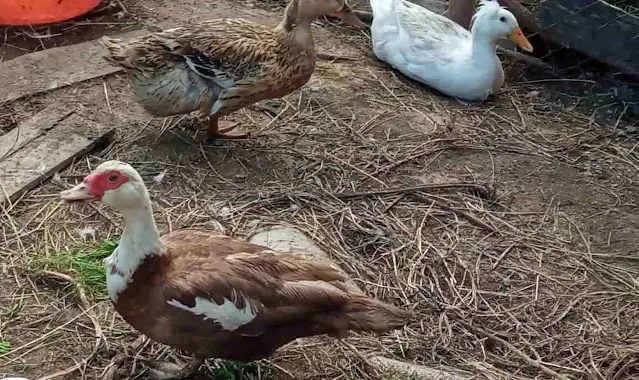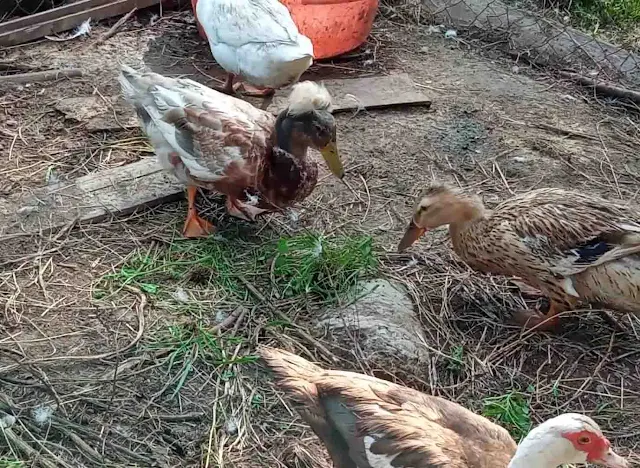reasons to get a duck as a pet.
Ducks can be great pets for many reasons! Ducks are very social animals and bond easily with their owners.
 |
| Is it good to have ducks as a pet? |
They enjoy interacting with humans and make wonderful companions.
Ducks are also relatively low-maintenance, as they need minimal grooming and their food is inexpensive.
Ducks also come in a variety of breeds and sizes, so there’s sure to be one perfect for you!
how to keep ducks as a pet?
The most important points for having a duck as a pet at home include:
- Ducks are social animals and bond readily with their owners, making them wonderful companions.
- Ducks require minimal grooming and their food is relatively low-cost.
- Ducks come in a variety of breeds and sizes, so you can find the perfect duck for your home.
- Ducks are easy to look after and take care of.
- Ducks provide endless entertainment as they explore their surroundings and interact with their owners.
In addition to the most important points for having a duck as a pet, here are some other advantages of having a duck at home:
- Ducks can provide companionship and learning opportunities for children.
- Ducks have their own distinct personalities, providing hours of entertainment seeing how they interact with you and the world around them.
- Ducks are relatively quiet pets that rarely cause a nuisance.
- Ducks are generally healthy creatures with minimal vet visits necessary.
- Ducks make a great addition to gardens and yards as they can help maintain the environment by eating insects and other pests.
how long do pet ducks live?
Pet ducks typically live between 10 to 12 years, although some may live up to 20 years with the proper care.
 |
| Is it good to have ducks as a pet? |
Ducks require a healthy and balanced diet, adequate living space, and regular care.
Additionally, ducks need regular check-ups from an avian veterinarian to ensure they're in good health.
What are the benefits of keeping ducks as pets?
Keeping ducks as pets can provide several benefits, including companionship, entertainment, and great nutrition.
Ducks provide an excellent source of food, typically in the form of eggs, and are known for being low maintenance and easy to care for.
They are also quiet and social animals that enjoy interacting with people.
Ducks are intelligent, independent animals that can be easily trained to follow commands.
They enjoy outdoor space and being able to explore, so having a garden or pond is ideal for them.
Additionally, some ducks may even learn to do tricks, and will offer an interactive and enjoyable experience when interacting with them.
Ducks can also provide a therapeutic effect with their calming nature and cheerful quacking.
Can you train a pet duck?
Absolutely! Ducks are known to be very intelligent animals and can be trained to follow simple commands, such as come, sit, and stay.
 |
| Is it good to have ducks as a pet? |
With patience and consistency, it's possible to teach your duck more complex behaviors.
They are also known to be incredibly social animals and will enjoy interacting with you.
Training your pet duck takes patience and consistency.
It also helps to use positive reinforcement when teaching commands, such as offering a treat when they comply with the command or praising them for doing the right thing.
You can also use hand signals to help reinforce your commands.
It's important to keep in mind that each duck is unique and may take different amounts of time to train, so be sure to be patient and not rush the process.
why ducks are good pets?
7 Ways to Train Ducks:
- Use Positive Reinforcement – Offer treats or praise when the duck follows commands.
- Use Hand Signals - Teach the duck hand signals to reinforce commands.
- Provide Space - Ducks enjoy exploring so give them plenty of space.
- Be Patient - Each duck is unique and may take different amounts of time to train.
- Keep Sessions Short - Training sessions should be short, no more than 15 minutes at a time.
- Use Consistent Commands - Always use the same words or hand signals to represent the same command.
- Reward Good Behavior - Reaffirm good behavior with treats, praise, or even a simple pat.
Do duck bites hurt?
Generally speaking, duck bites are not painful. However, they can be quite strong and may leave small marks or bruises.
 |
| Is it good to have ducks as a pet? |
If a duck is feeling threatened or agitated, it may bite as a defense mechanism.
It's important to always keep in mind that ducks can become easily stressed and should be treated with respect and kindness.
How to train pet ducks not to bite?
You can train pet ducks not to bite by providing them with plenty of space, using positive reinforcement like treats or praise when the duck follows commands, and using consistent commands with hand signals.
Additionally, reward good behavior and discourage bad behavior by simply removing yourself from the situation if the duck bites. With patience and consistency, you should be able to train your duck not to bite.
How intelligent are ducks?
Ducks are incredibly intelligent animals. They are known to be able to learn from experience and form complex relationships.
They also have strong problem-solving skills and can remember sequences of events. Ducks are even able to recognize faces, which is a testament to their intelligence.
What are some of the wonders of pet duck intelligence?
Here are some of the wonders of pet duck intelligence:
- 1. Problem-Solving – Ducks have strong problem-solving skills and can figure out complex tasks.
- 2. Memory – Ducks have an impressive memory and can remember sequences of events.
- 3. Recognizing Faces – Ducks can recognize familiar people and even differentiate between family members.
- 4. Socialization – Ducks are social animals and are known to form strong relationships with other ducks and people.
- 5. Communication – Ducks communicate with each other through quacking, body language, and even facial expressions.
duck as a house pet
Ducks can make wonderful house pets! They are low maintenance, easy to care for, and enjoyable to interact with.
Ducks also provide an excellent source of food in the form of eggs and are known to be quiet and social animals that enjoy people.
It's important to ensure they have access to an outdoor space where they can explore, Is it good to have ducks as a pet.
With patience and training, ducks can make great companions and bring a lot of joy to any home!
ducks as indoor pets
Ducks can be kept as indoor pets, but they do require a lot of space and attention.
It's important to ensure they have access to an outdoor area where they can explore and get some sunshine.
 |
| Is it good to have ducks as a pet? |
It's also essential to create a safe and comfortable environment to prevent any injury or accidents.
Additionally, ducks need to be regularly groomed, trained, and given plenty of toys and stimulation for them to be happy and healthy.
With patience and consistency, ducks can make wonderful indoor pets!
duck for a pet
Ducks are great pets for those looking for a low-maintenance and interactive companion.
They provide an excellent source of food, typically in the form of eggs, and are known to be quiet and social animals that enjoy interacting with people.
They are also intelligent and independent animals that can be easily trained to follow commands. ducks as a pet.
Ducks need to have access to an outdoor area where they can explore, and it's essential to ensure they are kept in a safe and comfortable environment.
With patience and dedication, ducks can make wonderful and fulfilling pets!
best ducks for pets
The best ducks for pets depend on several factors, including your lifestyle and environment.
Popular breeds of pet ducks include Call Ducks, Muscovy Ducks, Pekin Ducks, Cayuga Ducks, and Rouen Ducks.
 |
| Is it good to have ducks as a pet? |
Each breed offers its own unique temperament and characteristics and should be researched to ensure the right fit for you.
Additionally, any duck can make a great pet with the right amount of care and attention, ducks as a pet.
List of the best types of ducks as pets:
Here are some of the best types of ducks that make great pets:
- 1. Call Ducks – These small ducks are known to be friendly and vocal, making them a nice option for those looking for an interactive pet.
- 2. Muscovy Ducks – These large ducks are particularly sociable and have a calm temperament.
- 3. Pekin Ducks – Very popular as pets due to their docile nature and adaptability.
- 4. Cayuga Ducks – Known for their stunning black feathers and relatively quiet nature.
- 5. Rouen Ducks – Excellent swimmers and climbers, they can provide plenty of entertainment and interaction.
Call Ducks as Pets:
Call Ducks, more details about its breed and ways of living
Call Ducks is a type of small domestic duck, native to Great Britain and Europe.
The breed is believed to have been developed from wild mallards that were first domesticated in the 17th century.
Call ducks are known for their unique vocalizations, which were bred to attract other birds on hunt days.
They typically have a small body size, with an average weight of around 1.5 to 2 pounds, and ducks as a pet.
They come in a range of colors, most commonly buff or gray, though white and black varieties also exist.
Call ducks live for around 10 years and can lay up to 180 eggs per year.
They are omnivores and feed on a variety of plant matter, insects, larvae, mollusks, and seeds.
Muscovy Ducks as a Pet:
Muscovy Ducks, more details about its breed and ways of living.
Muscovy Ducks are large, wild ducks native to Central and South America.
The breed was domesticated by humans in prehistoric times.
Muscovy Ducks have a distinctive appearance, with their black and white feathers and long, fan-shaped tail feathers.
They have bare red facial patches, yellow eyes, and grayish or brown wings.
They can grow up to 30 inches long and weigh 6 to 9 pounds.
 |
| Is it good to have ducks as a pet? |
Muscovy Ducks prefer to live near sources of freshwater such as rivers, lakes, and marshes.
They are omnivores, feeding on both aquatic and terrestrial plants, insects, and small animals.
Muscovy Ducks typically live for seven to nine years and can lay up to 100 eggs per year.

